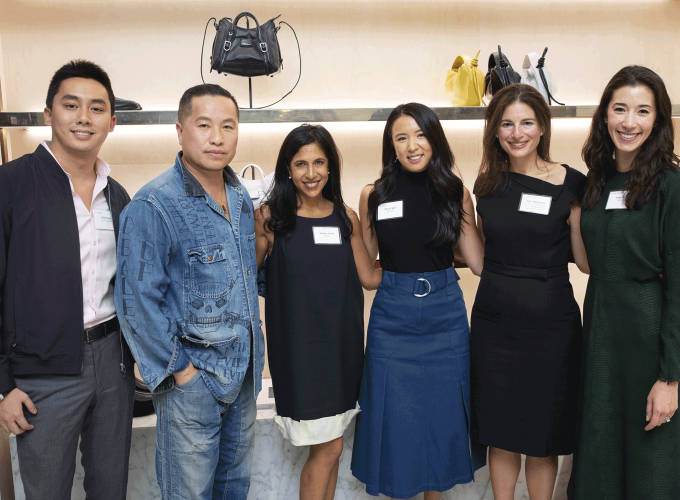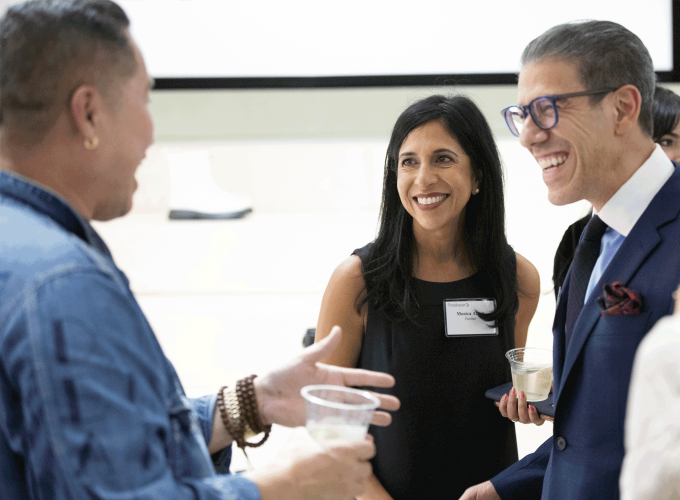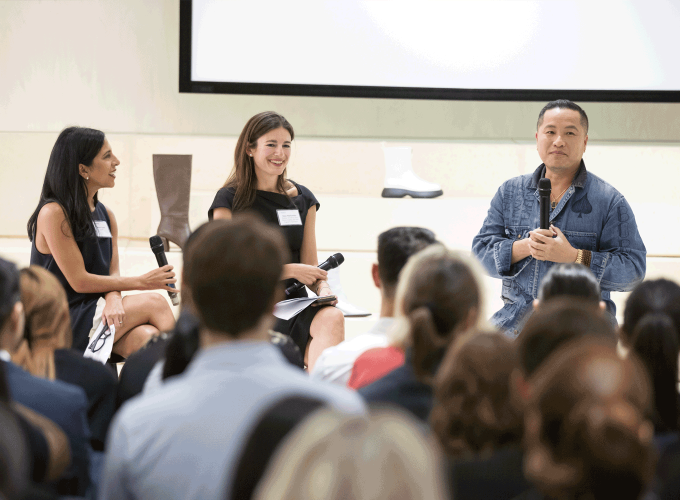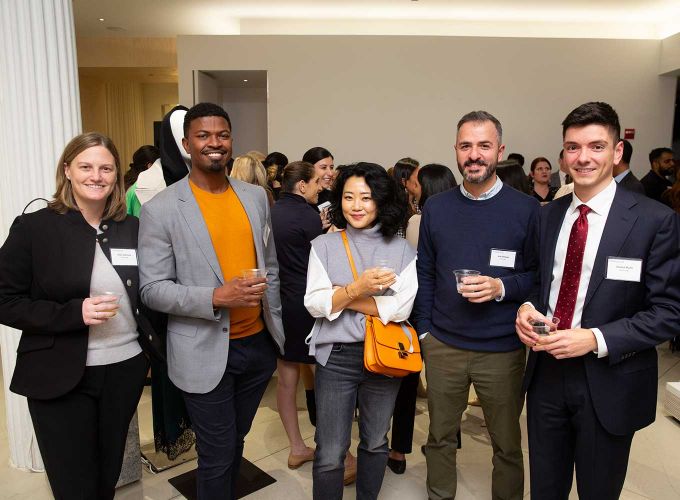Proskauer’s Asian Lawyer Affinity Group and Ares teamed up for a dynamic Q&A with fashion luminary and activist Phillip Lim, delving into the interplay between identity and entrepreneurship. Moderated by Ares' COO Jana Markowicz and Proskauer's Partner and Co-Head of our Private Funds Group, Monica Arora, the conversation underscored Lim’s journey from immigrant to industry icon and his efforts as a UN Human Rights Champion. The event, which drew members from both firms’ Asian affinity groups and beyond, not only spotlighted Lim's influential brand story but also supported the community, with proceeds benefiting Apex for Youth. This partnership exemplified the ongoing collective commitment between Ares and Proskauer to fostering diversity, authenticity, and social responsibility.
Read excerpts from our chat with Phillip, moderated by Proskauer’s Monica Arora and Ares’ Jana Markowicz.
Monica Arora: Tell us about how you created your brand, 3.1 Phillip Lim, and what that brand represents to you. I'm sure it's changed over time.
Phillip Lim: Wen and I came from similar backgrounds and upbringings where we watched our parents being taken advantage of. I had a vision of being able to build things for people who looked like us. People who are going somewhere, doing something – who have a dream and are working their way up. That became our mission statement, to create for everyday heroes and heroines.
Jana Markowicz: I love that. Tell us more about where you find your inspiration as you design.

Phillip Lim: When we first started, it was an obsessive drive to create beauty for people who looked like us – for global citizens. Fast forward to today, after almost 20 years, the brand is now repositioned as an Asian American fashion brand for change. It is not only the search of beauty, but the beauty in shared values.
Jana Markowicz: Now we’re talking about things beyond fashion. Tell us more about that. What drove you toward that reposition?
Phillip Lim: It’s a mixed bag of everything. Disaster. Devastation. Passion. Purpose. Grit.
At the onset of the COVID-19 pandemic, our community was being unfairly and unjustly scapegoated for a human virus. I was invited to appear on CNN to speak about community. I'm not an activist. I've just been activated. You don't have to be an activist – you can keep your day jobs. Let the activists be activists. It's our job to be activated, to support the activists and to lend them our platforms. To empower them, to embolden them, to continue to do every single day, what they do for humanity.
It was then that I started the first ever AAPI community fund on GoFundMe and raised over $7 million. It became a centralized place where people could learn what was happening to other parts of their community, helping them weed out a lot of false information that was being spread. To this day, we're giving out increments of the fund to different grassroots organizations. I have since spearheaded a project called House of Slay, a digital comic book and an inclusive space representing not only the AAPI heritage of its founders, but underrepresented voices from all walks of life. The idea is that we can be our own protagonists. Why can't I be a superhero in a comic book? I've never seen that before. If I can imagine it and gather people to create it, the next generation will see it. y newest project is creating a mental health space where all these emotions, traumas, feelings and awakenings can go.

Monica Arora: I love what you said about being activated. Tell us about how you became the superhero, human rights champion, and how that has morphed your brand.
Phillip Lim: When you start a brand, you’re told to let the product speak for itself, and to not insert your personal views in the narrative, because you will lose customers and business. But Wen and I were seeing our parents or people who look like our parents, our sisters, our colleagues, being assaulted viciously, every single day. At that point, it’s the business of humanity that matters.
Fashion has given me such an instant and powerful vehicle for change. It’s very difficult, because you can get canceled at any time. I don't want to live with that fear, especially when we're fighting for human rights. It's not about a singular right, and it's not about a specific group. It's about human rights. But we can't also address every single thing. It's like Jane Goodall said: act locally. When you feel overwhelmed and helpless, act locally, because that's where you can really make an impact. And that impact vibrates globally.
It’s never too late to wake up. Give your time and share your platform. Once you put it out there, likeminded people find each other. And from there, we build groups and groups turn into neighborhoods, and neighborhoods turn into communities and communities turn into movements. And then hopefully movements sustain all of us.

Monica Arora: On top of diversity, equity, and inclusion, one of the things our firms think a lot about is belonging. You certainly embody that by the stories that you've told, and what your brand is, too. Tell us how you think about belonging and in how that’s pivoted your brand.
Phillip Lim: The idea of belonging is so powerful because we're all looking to belong somewhere. Before we belong, we must believe. My mother believed in me. Wen believed in me. I was not trained. I never went to fashion school. Somehow, I was lucky to be brought up by women. I say women because it is women that believed in me. Once you believe there's something for you, you give yourself the permission to belong.
Our brand has been looking to find where it belongs. In America today, even in fashion, it may seem more open, but it's still closed in many ways. The fight to belong is every single day. And once you belong, you become. Becoming is so powerful. That's when you start to understand how to step into your power. That's when you allow yourself to build out your character. Believe, belong, become.
"Being entrepreneurial and collaborative are two things that tie both Proskauer and Ares together. From our Investing in Pride celebration to evenings highlighting ground breaking diverse entrepreneurs like Phillip Lim, our joint DEI efforts demonstrate how creating deeper partnerships can elevate more voices and more communities.”
Mark Bunbury Jr., Director of Diversity, Equity and Inclusion

